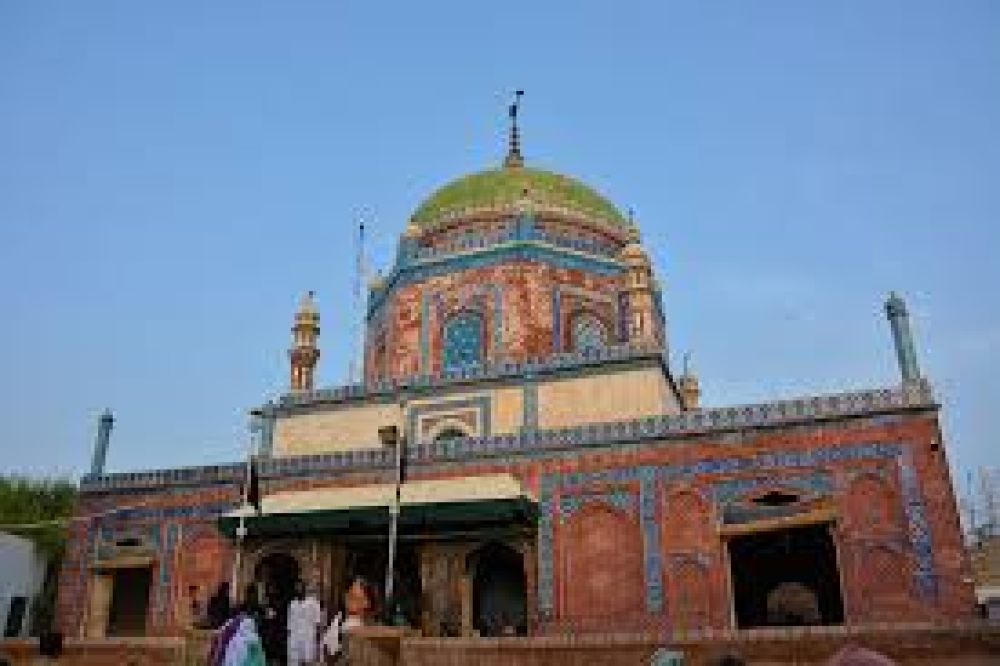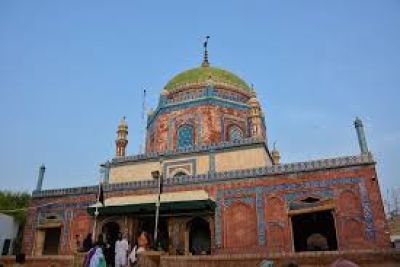

The Shrine of Shamsuddin Sabzwari, located in Multan, is a site of historical and cultural significance in Pakistan. As part of this guided historical tour, visitors will immerse themselves in the life and teachings of the renowned Sufi saint. Shamsuddin Sabzwari, who was a key figure in the spread of Islam in the region, left an enduring spiritual legacy. Guests will explore the shrine's architecture, with its intricate Islamic calligraphy and tile work that adorns the tomb and mosque areas. Further, the guide will narrate stories and events from the saint's life, as well as the shrine's role in the history of Multan. The tour provides an in-depth understanding of Sufi traditions and their impact on the culture of the sub-continent.
An evening at the Shrine of Shamsuddin Sabzwari in Multan is incomplete without experiencing a live Sufi Qawwali session. Qawwali is a form of Sufi devotional music popular in South Asia, and the sessions typically feature a group of singers who perform devotional songs to express their reverence for the saint. The shrine comes alive as rich melodies, heavy rhythmic undertones, and spiritually uplifting lyrics fill the air, often leading the audience into a trance-like state. These performances are a medium for both the performers and the audience to feel a deeper connection with the divine. It is also an opportunity to experience the unique musical style that is integral to the cultural fabric of the region.
The Shrine of Shamsuddin Sabzwari hosts an annual Urs, which is a festival commemorating the death anniversary of a Sufi saint, attended by thousands of devotees from across the country and even internationally. This event is filled with religious activities including live Qawwali music, Sufi dancing known as dhamal, and various other spiritual practices. Visitors to the Urs can witness a melting pot of cultures, traditions, and religions, reflecting the inclusive nature of the Sufi faith. It’s a profound way for attendees to experience spirituality and devotion. Visitors often participate in communal activities such as feasts (langar), prayer sessions, and discussions about Sufism. The Urs provides a unique cultural insight and is a memorable event for all involved.
For photography enthusiasts and architecture admirers, the Shrine of Shamsuddin Sabzwari offers an abundance of visually stunning motifs. The complex features traditional Islamic architecture with beautiful tile work, arabesque patterns, and calligraphy. Visitors can capture the play of light on the minarets, intricacies of the shrine's entrance, the geometric harmony of the interior, and the lively ambiance of local life that surrounds it. Photography inside the shrine allows for capturing serene moments of worship and reflection. It's an excellent activity for those looking to enhance their portfolio with architectural and cultural imagery. Guests are reminded to be respectful and seek permission where necessary, particularly when photographing individuals or religious ceremonies.
Langar is a community kitchen tradition at the Shrine of Shamsuddin Sabzwari, serving free meals to all visitors regardless of religion, caste, or creed. The experience offers a unique insight into the egalitarian principles of the Sufi faith and the hospitality that is central to Pakistani culture. Visitors sit together on the floor and are served simple but nutritious traditional food, emphasizing the notion of equality and brotherhood among all. Participating in langar can be a humbling and eye-opening experience, and is a must-do for anyone looking to understand the essence of communal harmony and the shrine's dedication to serving humanity.
The bazaars surrounding the Shrine of Shamsuddin Sabzwari present a vibrant marketplace where visitors can hunt for souvenirs such as traditional clothing, prayer mats, intricate handicrafts, and local sweets. Shopping here is not just about buying keepsakes; it's about engaging with local artisans, understanding the craftsmanship that goes into each product, and carrying a piece of Multan's cultural heritage back home. It's recommended to take some time to explore and bargain, as it is part of the shopping culture in Pakistan. Whether you’re looking for a unique piece of jewelry or a beautiful piece of fabric, these bazaars offer something for everyone.
Many visitors come to the Shrine of Shamsuddin Sabzwari seeking a peaceful and meditative experience. The shrine offers an atmosphere imbued with serenity and deep spirituality, providing a perfect setting for meditation and introspection. Individuals can find a quiet corner of the shrine or gardens to sit and reflect, perhaps reading from spiritual texts or simply enjoying the tranquility. This momentary retreat from the bustle of daily life can offer a significant sense of clarity and peace. Moreover, it allows visitors to connect with the foundations of Sufi practice, which emphasizes inner reflection and union with the divine.
The most significant weekly congregation, the Friday (Jummah) prayers, is a fascinating time to visit the Shrine of Shamsuddin Sabzwari. This is when the faithful gather in large numbers for the congregational prayer, which is led by an Imam, followed by a sermon. Visitors who are non-Muslims can observe from a respectful distance the unity and rhythm of the prayer, while those who practice Islam can join in. It provides a remarkable insight into Islamic practices and the communal aspect of worship. The energy and the communal spirit during this time is profound and reflects the core values of submission and discipline in Islam.
For history and religion scholars, the Shrine of Shamsuddin Sabzwari holds a collection of manuscripts and relics related to the life and teachings of the saint. Seeing these artifacts allows for a deeper understanding of the spread of Sufism in the region and the work of Shamsuddin Sabzwari. The collection is significant, as many of these items are centuries old and have been preserved through careful stewardship. While some manuscripts are kept away from public display to ensure their preservation, special viewings can sometimes be arranged for educational purposes.
A visit to the Shrine of Shamsuddin Sabzwari is not just a spiritual journey; it's also an opportunity to explore the culinary delights of Multan. The area around the shrine is dotted with local eateries where one can taste a variety of traditional foods, such as the famous Multani Sohan Halwa, a sweet dense dessert, or spicy chaat and samosas. Here, visitors can treat their taste buds to the flavors that are an intrinsic part of the local culture. Food tasting can be easily combined with a stroll through the bazaars, offering a well-rounded experience of the local flavors and social ambiance.
